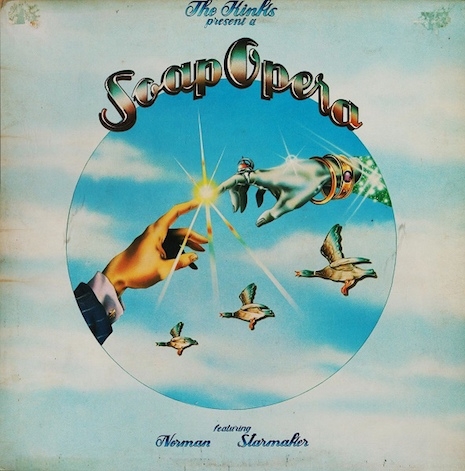
Even the most passionate of Kinks fans will be forced to admit that the 1970s saw a few too many failed experiments in the rock opera direction. Taking all of the grandiose Kinks Koncept albums (see what I did there) after, what, Lola Versus Powerman And The Moneygoround, Part 1 perhaps (Muswell Hillbillies doesn’t count), one of the ones that probably stands up best today is The Kinks Present a Soap Opera from 1975. I’m none too fond of the central idea of the all-powerful musical demigod Starmaker masquerading as regular-bloke Norman for a day so that he can go off and imbue the lives of ordinary folks with his magical anthems, no sir I am not. But the songs are pretty decent and there’s at least some humor in it, which some of Ray’s other big concept albums sorely lack.
What I didn’t know until recently was that Ray Davies starred in a live staged version of Soap Opera taped for Granada Television about eight months before it was released as an album, with Ray playing the double role of Starmaker/Norman. In a rather demanding role, June Ritchie played Norman’s wife. It’s a full-on production with the Kinks acting as the backup band, and a whole host of singers and dancers. It was taped in front of a live audience on July 25, 1974, and broadcast on September 4 of the same year. The Soap Opera album wouldn’t come out until the following May.

One of the problems with Soap Opera is that the central conceit of the Starmaker is just waaaay too close to Davies himself for my taste. The staged version of the play suggests an uneasy mashup between kitchen-sink drama and a big, heavy-handed, idea-driven satire à la Network. And in fact Soap Opera probably would have worked better if Starmaker was a TV executive rather than a big rock star—it fits naturally, a soap opera is after all a genre designed for TV/radio to begin with. What you’re left with is Davies trying to say something about the entertainment industry and ordinary life but in fact seems to really be all about Ray’s ego, and that’s a palpable flaw.
In any case, the Starmaker Granada show wasn’t a big success, but it’s surprisingly watchable and entertaining. For one thing, they’re almost always singing, and the songs are pretty good, as I said earlier. The staging is almost “theater in the round,” which was fashionable in the 1970s but for darn good reasons has stopped being a common method of presenting drama. Davies is remarkably fluent as an actor, and he’s required to do a whole hell of a lot here.
According to Doug Hinman,‘s The Kinks: All Day and All of the Night, it wasn’t a big success, as Ray showed some discontent with how it all came off.
A little later, Ray reveals that he was too self-conscious to watch Starmaker on TV. “I just didn’t want to know. I knew it was going to be bad. It wasn’t the producer’s fault. That guy [Dennis Wolfe] is suffering, trying to use rock bands, trying to break new ground, and his Light Entertainment department don’t wanna know. So we got squeezed into some late-night slot, and we got the guy who does the drama sound. … We always get resentment from those kind of people because we’re a rock band trying to do something on a theatrical level. Theatrical people don’t like us infringing on their territory.
According to Hinman, Dave Davies wasn’t too thrilled about the Granada appearance, especially “how poorly the band were treated by the crew” as well as “his feeling of being reduced to a sideman in what he sees as a vehicle for Ray alone rather than a Kinks project.” It really does seem like a 100% Ray project, so it makes sense that Dave saw it much the same way.
By the way, it seems that Bobcat Goldthwait has written a movie treatment based on Schoolboys in Disgrace, and he and Ray Davies been “trying to get this movie going for a while now.”